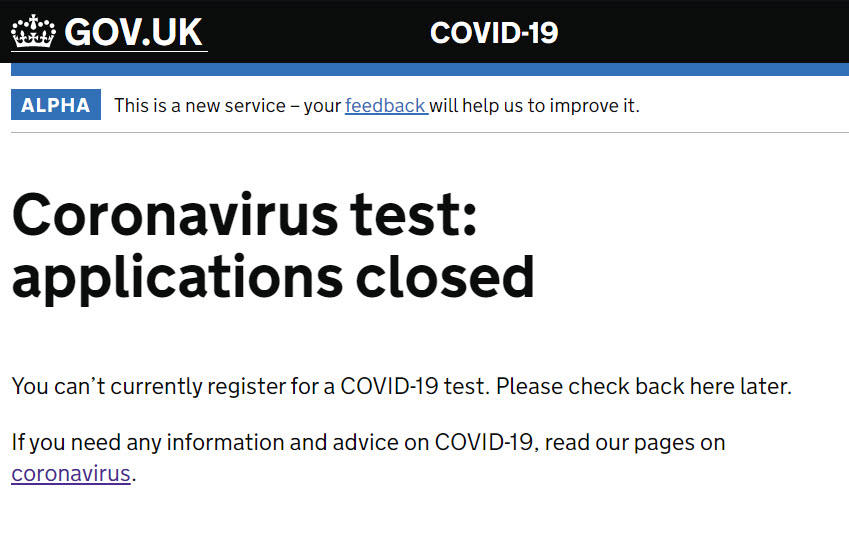The revelation that tens of thousands of samples from Covid-19 testing centres were being airlifted to the US for processing by a university in the southern US states is just the latest chapter in the unfolding saga of government incompetence and failure to properly utilise NHS capacity.
It must now be obvious to even the most bone-headed Boris Johnson fan that ministers and civil servants shamelessly fiddled the figures and changed their definition of a test completed to give the false impression that 100,000 tests were carried out on April 30.
Even the right wing press has now exposed the fact that tens of thousands of these ‘tests’ proved to be nothing more substantial than posting out over 40,000 test kits (thousands of them with no return address labels) speculatively to individuals and to hospitals.
In the run-up to Matt Hancock’s self-imposed deadline to hit his self-imposed target the Department of Health even resorted to the desperate tactic of emailing the Conservative Party’s ageing membership urging them to book a test.
And immediately afterwards – as Boris Johnson arbitrarily set a new impossible target of 200,000 tests a day by the end of June – reported levels of testing have slumped well below the 100,000 mark, and below 70,000 on May 6.
Meanwhile the chaos of testing continues. One Norfolk key worker was advised to get tested by 111 because there were no home testing kits available, only to be told that the nearest available ‘local’ drive-through testing centres were all upwards of 320 miles away, in Scotland (Perth or Aberdeen) or Northern Ireland (Belfast or Portadown). When they tried again, signing in as having been referred by 111 rather than a key worker, they were offered Nuneaton, Bakewell or Bromsgrove – the closest of them over 109 miles away.
Flying test samples to the US – on the pretext of a problem with a laboratory in Northern Ireland – indicates clearly that the new network of three unaccredited ‘super-labs,’ set up by the government in preference to using the established skills and equipment of the existing network of 44 NHS labs despite the opposition of the biomedical science professional body, has failed.
The Lowdown reported two weeks ago on the concerns raised by NHS laboratory staff and by the Institute of Biomedical Science over NHS laboratories having to compete for scarce reagents with the government’s new “Lighthouse Labs” in Milton Keynes, Cheshire and Glasgow.
The Independent now reports further criticism from Allan Wilson, president of the Institute of Biomedical Science (IBMS), arguing that “political dogma” driving decisions on the next phase of testing for Covid-19 was causing frustration among NHS laboratories. He argues that the health service labs have more than enough capacity to do more than 100,000 coronavirus tests a day.
The BBC correspondent Sharon Barbour recently highlighted the automated machinery in place at Gateshead Hospital, capable of processing 6,000 tests a day. Similar equipment is in place in the virology lab of Newcastle’s Freeman Hospital, yet instead of using these state of the art machines, samples from the North East are being shipped over 200 miles south to the makeshift Milton Keynes super-lab.
And the Lighthouse Labs have been given the lion’s share of the resources. Allan Wilson points out: “Because of the lower supply we are doing 25 to 30,000 samples a day but that’s only because of the supply chain. We could be doing three times as much if not more. The real constraint is the supply chain and we also end up competing with the Lighthouse laboratories.”
Meanwhile to add yet another looming disaster to a seemingly endless series of cock-ups, ministers seem determined to ignore the network of 5,000 experienced local government contact tracing experts, and instead bring in private contractors Serco – and probably other equally unqualified firms such as G4S – to carry out most of the contact tracing work that logically should follow up on tests that prove positive. Serco pulled out of tendering for NHS clinical contracts six years ago after a string of contract failures in community services and primary care. Only last year they were fined £19.2m by the Serious Fraud Office as part of a settlement over an electronic tagging scandal.
Now they will be tasked with recruiting 15,000 call centre staff, who according to The Times will be given only about one day’s training in the principles of contact tracing before being entrusted with a task vital to containing the virus.
What could possibly go wrong?
Dear Reader,
If you like our content please support our campaigning journalism to protect health care for all.
Our goal is to inform people, hold our politicians to account and help to build change through evidence based ideas.
Everyone should have access to comprehensive healthcare, but our NHS needs support. You can help us to continue to counter bad policy, battle neglect of the NHS and correct dangerous mis-infomation.
Supporters of the NHS are crucial in sustaining our health service and with your help we will be able to engage more people in securing its future.
Please donate to help support our campaigning NHS research and journalism.


